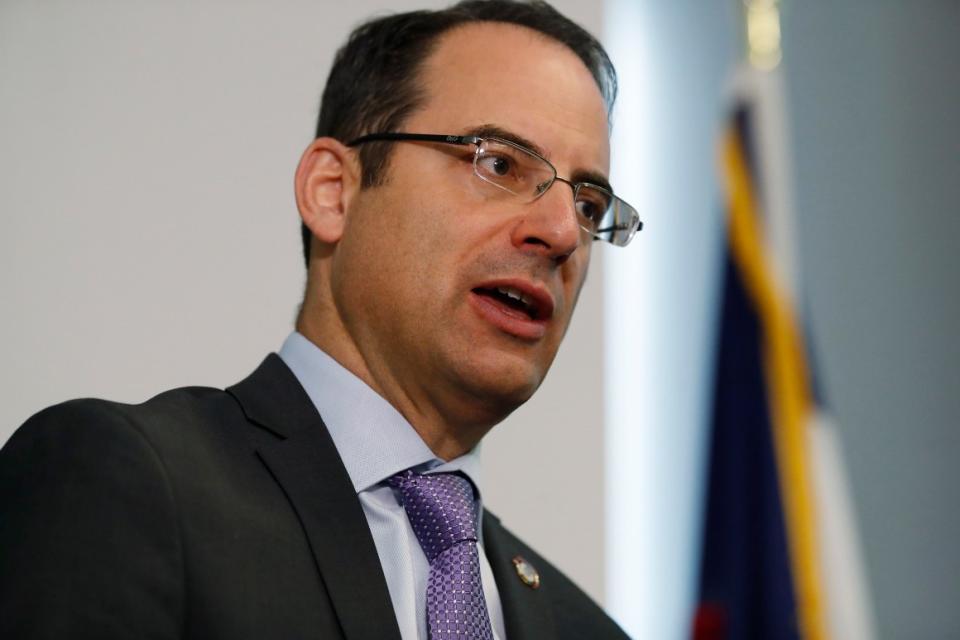What the Google suit may look like if Biden wins
- Oops!Something went wrong.Please try again later.
If Joe Biden wins the presidency, he’ll get the opportunity to shape the future of the Trump administration’s landmark antitrust suit against Google. And that could mean even more trouble for the search giant.
Many in Biden’s party are pushing for strong action against Google. Democratic state attorneys general refused to join the case the Justice Department filed Tuesday because they want to file a broader and more aggressive complaint. Biden is expected to take his cues for how to handle the case from those same Democratic AGs.
And with the progressive wing of the Democratic party increasingly calling for breakups of Big Tech, there will be pressure on Biden to go after the core business models of the massive internet companies that have come to dominate both the U.S. economy and everyday life.
“There is just so much momentum moving against monopoly power, particularly in tech,” said Sarah Miller, executive director of the American Economic Liberties Project. Biden will be “inheriting not just a single case from the DOJ. They are inheriting a major turning point in the way the public understands how public institutions relate to corporate power.”
While the DOJ suit is focused on allegations that Google’s contracts create unfair barriers to competitors in online search, Democratic-led states like Colorado, New York, North Carolina and Iowa are part of a bipartisan group of about 37 states that are drafting a separate suit challenging the way Google uses its search engine to favor its other businesses, along with its dominance over advertising technology.
The states’ suit is designed so they wouldn’t be forced into a settlement if the Justice Department backs off from pursuing a breakup or significant changes to how Google’s business is structured.
A settlement is a possibility under either administration and the most concrete sense of how the suit would be treated by Biden will be who he picks as attorney general.
The Biden campaign did not respond to requests for comment for this story, but has said previously they don’t intend to make any personnel decisions before the election.
There are names circulating however, and they range from trustbusters to some with strong tech ties. Among those are Sen. Doug Jones, the Alabama Democrat who is running for reelection and expected to lose; New York Gov. Andrew Cuomo, who says he isn’t interested; and Tish James, New York’s attorney general. James, who has been a leader in the state antitrust probe into Google and Facebook, would likely push for DOJ to aggressively pursue Google. During his tenure as New York AG, Cuomo also pursued a major antitrust case against Intel, while Jones is more of an enigma having spent his legal career on civil rights.
Karen Dunn, a former associate White House counsel under Obama and a longtime antitrust attorney for Apple is also said to be in consideration to head antitrust operations at DOJ.
Should Biden win the election, his administration will have three possible options with the Google lawsuit: continue the suit as is; broaden it; or settle it.
Continue it
Because antitrust cases tend to take several years, it’s not uncommon for them to span administrations. IBM’s antitrust case was filed on the last day of the Lyndon B. Johnson administration and wasn't resolved until more than a decade later, when President Ronald Reagan took office. The antitrust suit against telecom giant AT&T was filed in 1974 under President Gerald Ford, and continued through the Carter administration before it settled in 1982, also under Reagan.
And the Google suit as filed has been embraced by those on both sides of the aisle.
Some had worried that it would be much more contentious. As news emerged last week that the Justice Department planned to file its suit without Democratic support, some Google opponents feared DOJ was pulling its punches to get a lawsuit out the door. Tuesday’s complaint largely assuaged many of those concerns.
Jeffrey Jacobovitz, an antitrust partner at Arnall Golden Gregory, called it a “straightforward” monopolization case and likened it to the DOJ’s Microsoft case, where he represented a company that complained about the tech giant.
Microsoft's case “was similar allegations involving exclusionary contracts,” he said. “This tracks that.” The case against Microsoft targeted the company’s contracts with computer manufacturers and AOL, which required them to bundle its Internet Explorer browser with the Windows operating system. The Google case focuses on the search giant’s contracts mandating that its search engine be the default in Android smartphones and in browsers such as Apple’s Safari and Mozilla’s Firefox. Jacobovitz is not involved in the Google suit.
Broaden it
If Biden wants to follow the states’ push to go broader, he may have a template in hand well before January.

Colorado Attorney General Phillip Weiser, who served as a top DOJ antitrust official under President Barack Obama, has been leading the states’ investigation into how Google uses its power over search to advance its business. Colorado is a lead on the probe alongside Democratic prosecutors from Iowa, North Carolina, New York and Republican prosecutors from Nebraska, Tennessee and Utah.
In a joint statement, the states said they are continuing their investigation, which they hope to conclude “in the coming weeks.”
“If we decide to file a complaint, we would file a motion to consolidate our case with the DOJ’s,” the states said. “We would then litigate the consolidated case cooperatively, much as we did in the Microsoft case.”
The states have been skeptical of strategic and legal decisions made by Attorney General William Barr and his DOJ team investigating the search giant and hope to file a broader case challenging how Google uses its search engine to promote its own products rather than rivals’, an approach known as “self-preferencing.”
Both the Justice Department and the states are also separately investigating Google’s dominance in the advertising technology market. Google is the No. 1 player in the $162.3 billion global market for online display advertising and sweeps up as much as 42 cents for every dollar spent on those ads, according to a recent U.K. study.
Once the states file, a Biden Justice Department could look to that complaint as well, Jacobovitz said.
“They could amend the complaint and add counts and also add parties,” he said. “It also could all end up one big lawsuit if the states want to go along with DOJ.”
Gary Reback, a lawyer with Carr & Ferrell, said the current DOJ complaint has “sufficient flexibility” in the way it was written that prosecutors could try to bring in other aspects of Google’s business, such as self-preferencing.
They are “giving themselves considerable wiggle room,” said Reback, who represented several companies in the Federal Trade Commission’s Google probe in the early 2010s but isn’t involved in Tuesday’s investigation.
The Justice Department’s complaint doesn’t allege that Google’s self-preferencing is an antitrust offense itself. Rather prosecutors argue that ability to prefer its own products is an effect of Google’s monopoly power, Reback said.
“If you made a complaint that listed self-preferencing as an antitrust offense, that would be broader than what we have,” he said. “It would be a shot across the bow of Amazon, which has been accused of the same behavior.”
Gene Kimmelman, a senior adviser for Public Knowledge, also said a Biden DOJ could broaden their approach to Google in a way that could impact other tech titans.
“Launching this case doesn’t end up just being about Google,” said Kimmelman, who served as a DOJ antitrust official under Obama. “It opens the door to more aggressive intervention across multiple tech platforms.”
Settle it
Under President Barack Obama, Google representatives met with White House officials on average once a week, according to the nonprofit watchdog Campaign for Accountability. And Obama’s Justice Department challenged just one acquisition out of the hundreds Big Tech made during his eight years in office, a recent House report said.

Some tech critics fear the Biden administration could return to that friendly approach when considering the Google suit. They note that the Biden team is seeking advice from Obama administration veterans and drawing donations from tech industry leaders. Kamala Harris also served as California’s attorney general from 2011 to 2017, years Europe spent actively investigating Google’s growing power and the tech sector while the U.S. failed to take any meaningful antitrust action.
Republican Sen. Josh Hawley, who as Missouri’s attorney general in 2017 launched his own antitrust probe into Google, expressed concern during a call with reporters Tuesday that a Biden administration could “shut this suit down or just pull it back and pursue a settlement.”
Both the Justice Department and Google representatives declined on Tuesday to discuss whether any settlement talks have already taken place.
It’s not uncommon for prosecutors to propose settling antitrust suits that aren’t popular with a new DOJ. The George W. Bush Justice Department reached a settlement with Microsoft in 2001 after inheriting the case from the Clinton administration.
“The change of administration can have a large impact on antitrust enforcement,” said Jacobovitz, who recalled how a monopolization case he worked on as a young FTC prosecutor was settled by the incoming Reagan administration.
Any settlement though is likely to face stiff scrutiny from Congress. Even as Democrats dinged the suit’s timing two weeks before the election, many hailed the suit as long overdue and indicated they will be closely watching as it proceeds into the next administration.
House Judiciary Chair Rep. Jerry Nadler (D-N.Y.) promised Tuesday to continue “robust oversight of the antitrust laws and the antitrust agencies.”
In extreme situations, the Justice Department might opt to kill a case entirely, but Economic Liberties’ Miller, who has been involved in antitrust working groups for the Biden campaign, said that’s unlikely here.
“If this was a one-off thing coming from the middle of nowhere” maybe, she said. But the Google probe “is bipartisan and the investigations completed in the House and DOJ complaint are not only sound, but historic in their scope and level of detail.”
CORRECTION: A previous version of this report incorrectly described Jeffrey Jacobovitz's past employment as a government prosecutor.

